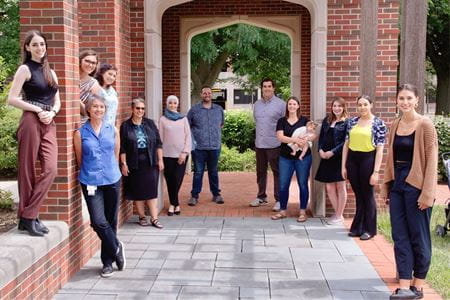Indiana helps drive global progress in Type 1 diabetes screening through TrialNet
Jackie Maupin Nov 14, 2024

More than 250,000 people have been screened for Type 1 diabetes risk worldwide through TrialNet, with over 10,000 screenings conducted locally by the team at IU School of Medicine's TrialNet clinical research center at Riley Children's Health.
Locally, Indiana University School of Medicine’s TrialNet clinical center at Riley Children’s Health has contributed by conducting over 10,000 screenings, helping Hoosier families be better prepared for life with the autoimmune disease.
Type 1 diabetes occurs when the immune system mistakenly attacks the pancreas' insulin-producing beta cells, requiring those affected to undergo daily insulin therapy for blood sugar level management. Research indicates that individuals with a family history of Type 1 diabetes are 15 times more likely to develop the disease. To address this increased genetic risk, TrialNet offers risk screenings using blood samples to help families identify antibodies that indicate the early stages of Type 1 diabetes. The goal is to detect the disease before symptoms develop, helping to reduce the risk of life-threatening health complications.
Linda DiMeglio, MD, MPH, the Edwin Letzter Professor of Pediatrics and Division Chief of Pediatric Endocrinology, has led IU School of Medicine’s TrialNet clinical center since 2010 and now serves as TrialNet’s vice chair.
“Screening 250,000 persons is a huge achievement. Our research group is proud of TrialNet’s impact, especially in Indiana,” DiMeglio said. “Our work goes beyond screening. We’re building relationships with families and providing peace of mind to people who are at risk or with early-stage or clinical disease. We’re also offering trials designed to stop the loss of insulin-producing cells to people who are recently diagnosed, and, ultimately, contributing important data to speed the process towards cures for Type 1 diabetes.”
Other IU School of Medicine physician-scientists actively involved in TrialNet include Carmella Evans-Molina, MD, PhD, who is also co-principal investigator of the IU clinical research site and leads two open TrialNet studies; Emily Sims, MD; Heba Ismail, MD, PhD; and Jamie Felton, MD. They work alongside the entire clinical diabetes research team, which includes pediatric and adult endocrinology physicians as well as nurses, coordinators and other specialized staff.
Type 1 diabetes progresses through three stages, with the final stage (Stage 3) marking a clinical diagnosis. TrialNet’s research was key in defining these stages and was used to identify participants for the Teplizumab Prevention Study, which led to the first FDA-approved immune therapy drug to delay the onset of Stage 3 Type 1 diabetes in early-stage individuals. Early data from the IU School of Medicine’s TrialNet site played a crucial role in this study and eventually resulted in members of the IU team treating the first child in Indiana with Teplizumab in 2023.
“TrialNet’s success has changed the way people think about Type 1 diabetes,” DiMeglio said. “Our screening and research participants have enabled us to move from understanding risk to actively preventing disease progression, one step at a time. We owe so much of this progress to those individuals and their families.”
In addition to offering TrialNet screenings, the pediatric diabetes and endocrinology team oversees multiple clinical studies focused on preventing disease development in people who are high risk, preserving beta cell function in newly diagnosed patients and improving the quality of life for people with established diabetes through technology and therapeutics. Visit the Type 1 diabetes clinical research website for more information about TrialNet screenings and open clinical trials.
Jackie Maupin
Jackie serves as the communications lead for the IU School of Medicine Department of Pediatrics, with a focus on the Herman B Wells Center for Pediatric Research. She specializes in storytelling, writing news and feature articles that highlight the achievements and impact of the department’s faculty, staff and trainees. She has several years of experience in non-profit and academic marketing and communications.